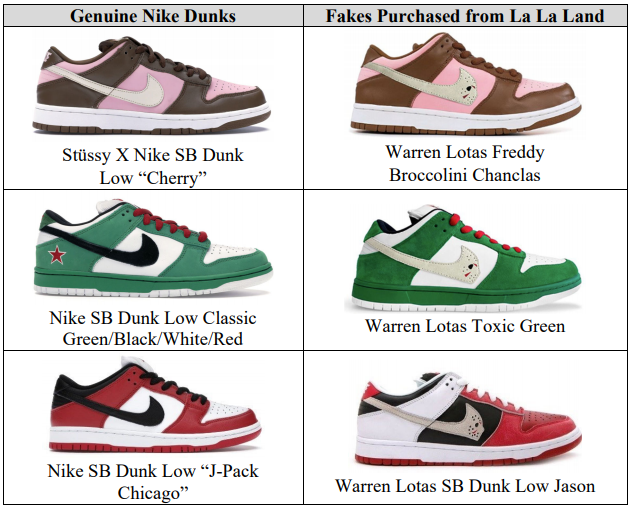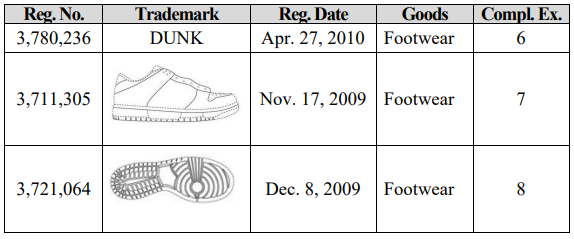International sportswear company Nike filed a lawsuit against a Los Angeles-based manufacturer alleged to have produced thousands of inauthentic Nike® Dunk®-inspired sneakers.
Interestingly, the lawsuit was filed shortly after Nike settled an earlier lawsuit it had filed against Warren Lotas, the designer of the same allegedly infringing sneakers. Lotas, an influential designer in the streetwear community, developed a large following through his graphic-novel-inspired style, and collaborated earlier this year with The Weeknd to produce distinct Super Bowl LV merchandise which was worn by the Weeknd during his halftime headline performance. Lotas promoted his sneakers as “official reinterpretations” of the classic Nike sneaker. Total sales of Lotas’s sneakers allegedly reached $10.8 million, with 36,000 customer purchases. Nike filed suit against Lotas in October 2020.
In early December, Nike attained a preliminary injunction from Judge Mark C. Scarsi in U.S. District Court for the Central District of California, which barred Lotas from further “selling, fulfilling or soliciting pre-orders of shoes called the X Staple Pigeon OG and the Freddy Broccolini Chanclas.” Side-by-side images of Nike’s sneakers and Lotas’s sneakers are shown below:


The original Nike® Dunk® sneakers shown above typically sell for multiple thousands of dollars in the resale market due to their scarce production and rare, coveted status amongst “sneakerheads.” Nike alleged that the flood of counterfeit false-customizations of the rare sneakers would both confuse customers and depress the market, releasing the following statement:
“Nike files this lawsuit to protect its intellectual property and to clear the confusion in the marketplace by setting the record straight — not a single component of Warren Lotas’ fake sneakers comes from an original Nike Dunk.”
The suit between Lotas and Nike settled in mid-December after the issuance of the preliminary injunction for an undisclosed amount.
In this second lawsuit, Nike alleges that the defendant, La La Land Production & Design, infringed Nike’s registered trademarks and trade dress by knowingly manufacturing, producing, and selling fake Nike products. In its complaint, Nike claims that the defendant intended to profit from Nike’s “iconic and distinctive brand” and that it seeks recourse against “various bad actors in the U.S. and abroad,” including the entire counterfeit supply chain from “manufacturers and distributors” to “direct-to-consumer infringers.” La La Land put out a statement to Law360 that it functioned only as a manufacturer for Warren Lotas, Lotas had indemnified La La Land, and the “lawsuit by Nike is completely baseless and founded in erroneous assumptions.”
Although Nike’s case against Lotas settled, Nike is gearing up for round two in this trademark and trade dress battle. In its lawsuit against La La Land, Nike asserted the following trademark and trade dress registrations related to the Nike® Dunk® products:

In its recently filed answer, La La Land asserted counterclaims to cancel Nike’s trade dress registrations related to its Dunk® products alleging that the trade dress is functional and thus invalid.
It is possible that, in addition to being an effort to protect Nike’s trademark and trade dress rights, this dispute may also boost the market for Nike’s Dunk® shoes even further. The proliferation of fake sneakers and the raising of the authentic designs’ profiles through public litigation could increase the authentic shoes’ coveted status in new customer segments and existing sneakerhead communities. Sneaker notoriety has ignited rabid consumer interest in the past, perhaps most famously when the NBA banned the Air Jordan 1 and fined Michael Jordan for wearing the shoes during games.
The takeaway of this saga for brand-owners is to stay on top of the market in which your products circulate – even resale and after-market customizations – as downstream activity could result in a loss of trademark rights or dilution of your marks’ value and goodwill. Further, it is important that trade dress owners like Nike anticipate that enforcement efforts may result in attacks on the validity of the trade dress. Owners should be prepared with strong arguments to combat allegations of functionality, and should be able to identify a range of alternative non-infringing designs.
If designers and artists plan to create customizations or iterations of the protected works of others, they should contact the brand owner to obtain a license or other agreement ensuring that they will not object. Designer-manufacturer collaborations can be a win-win-win for designers, brands, and consumers – the designer gets the chance to remix a classic and/or established design, the brand gets an interesting and unique facelift on an established product, and the most passionate consumers get access to rare and artistic versions of their favorite goods.
Editor: Catherine Holland